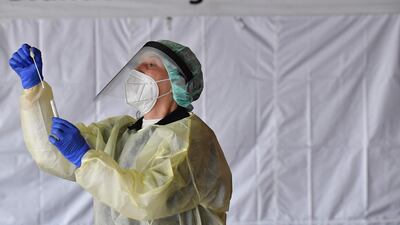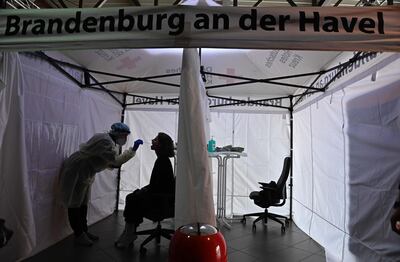Germany plans to set up dozens of vaccination centres nationwide to administer the Covid-19 jab.
Regional authorities will accelerate preparations for establishing about 60 centres, with mobile units to support efforts in giving the population the jab.
Large exhibition halls were being discussed as potential sites for the centres.
Pfizer's vaccine must be shipped and stored at minus 70°C, raising potential issues with distribution. Doctors' surgeries are unlikely to have the necessary equipment so larger, purpose-built centres are likely to be needed.
Germany this month re-imposed tough measures to help slow the Covid-19 outbreak, with schools, daycare centres and shops staying open while restaurants, bars, leisure and cultural centres had to close.
Chancellor Angela Merkel said on Sunday that extraordinary curbs such as mask wearing or social distancing may be in place for months to come yet.
Only when 60 per cent to 70 per cent of the population has achieved immunity – either through vaccination or having caught the virus – can Covid-19 be deemed to have been "more or less overcome", she said.
"Then we can also lift all restrictions," Ms Merkel said.
Priority for a future vaccine, which would be not be compulsory, would go to the elderly, health workers and others at greater risk from the coronavirus.
"It is important that we protect those who are at highest risk first," health minister Jens Spahn said after a cabinet meeting on Monday about Germany's vaccination strategy.
About 40 percent of the country's fast-ageing population of about 80 million people is deemed to be in the risk group.
Besides the elderly and chronically ill, those with the highest exposure potential to the virus, such as healthcare workers and carers, would also be given priority, he said.
Mr Spahn's statement came as hopes rose for a vaccine in coming weeks.
Last week, German company BioNTech and US giant Pfizer announced that Phase 3 trials had shown their vaccine to be 90 per cent effective in preventing Covid-19 infections.
According to preliminary findings, protection in patients from a wide variety of ethnic backgrounds was achieved seven days after the second of two vaccine doses, and 28 days after the first.
The companies said they expect to supply up to 50 million vaccine doses globally in 2020, and up to 1.3 billion in 2021.
While welcoming the BioNTech-Pfizer news, Mr Spahn noted there would not be enough vaccines for everyone immediately.
Earlier, government advisers, the Leopoldina Academy, the Stiko vaccine commission, Germany's Ethics Council and disease control agency RKI had also made a case for some to be given doses before others.
"We will need prioritisation. We need to do it in such a way that on the basis of best available evidence, we achieve the best benefit for the whole population," said Thomas Mertens, who chairs Stiko.
Switzerland has similar plans for specialist centres to deliver the deep-chilled Covid vaccine.
Health experts said such a vaccine comes with special challenges because the genetic material it consists of must be stored at minus 70°C or below.
This could complicate any inoculation programme, particularly in regions such as parts of Asia or Africa where the climate is warm, distances vast and where the required infrastructure may be lacking.
The World Health Organisation called the Pfizer-BioNTech vaccine data exciting, but said it "presages significant cold chain challenges for African countries".
Thomas Steffen, Basel's cantonal doctor and a board member of the Swiss Doctors Association, said groups considering distribution of a Covid-19 vaccine are working with different scenarios, including for one like Pfizer's.
"We have to have a solution if we need to chill the vaccine to minus 70°C, and in that case organise the distribution ... differently than if it were stored at a temperature of a refrigerator," Mr Steffen said This was likely to mean having to use centres, he said.
The Swiss have reserved nearly 10 million doses of vaccine candidates that AstraZeneca and Moderna are developing, should they pass trials.



